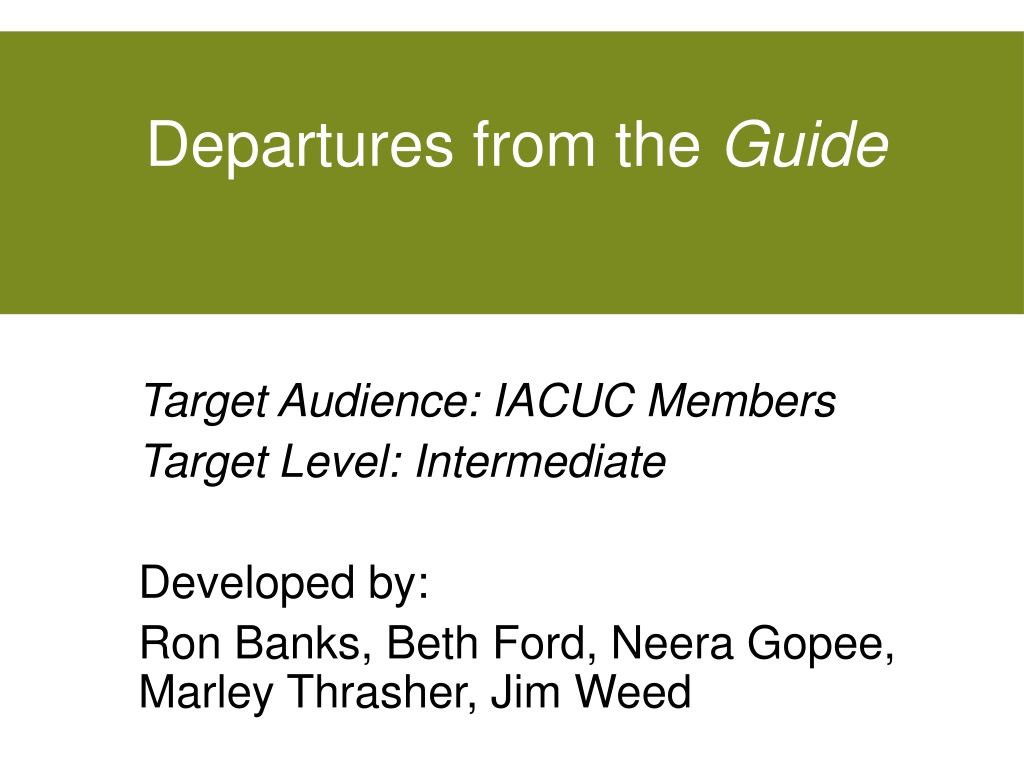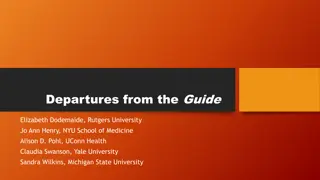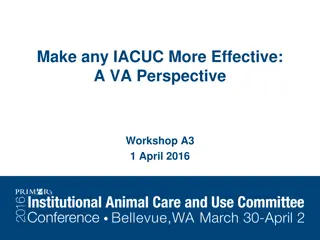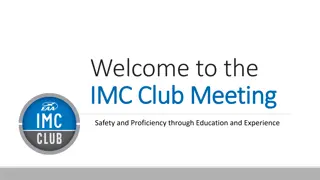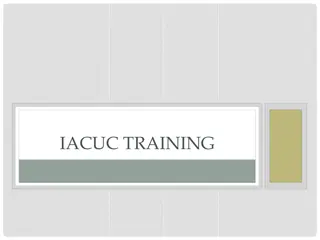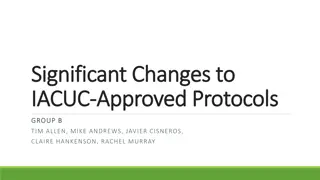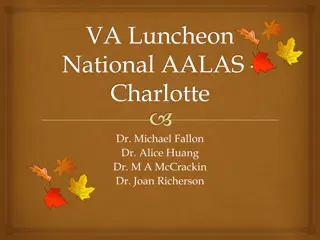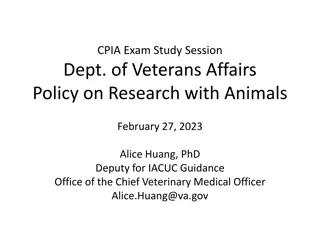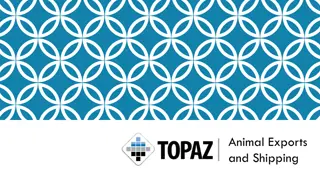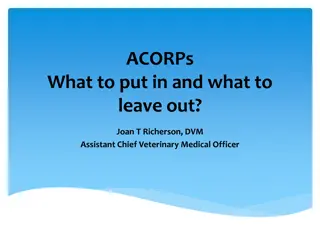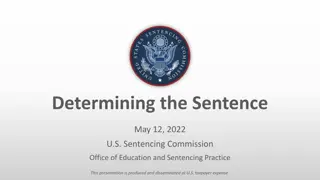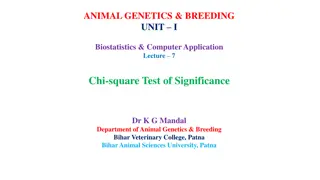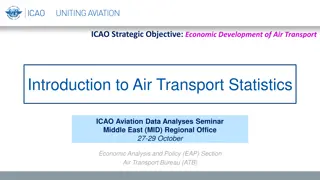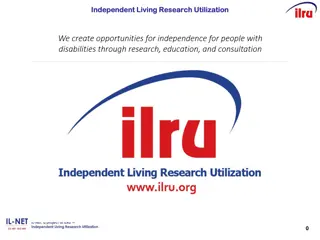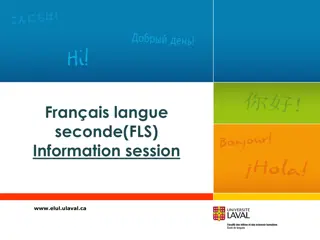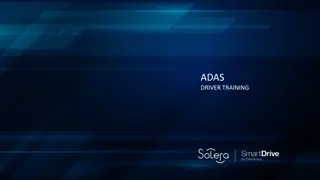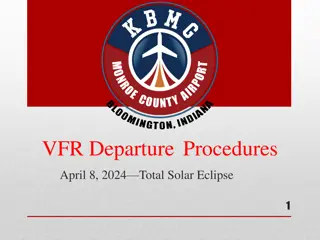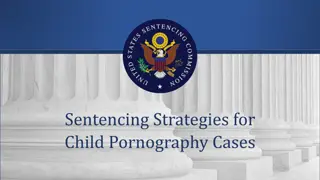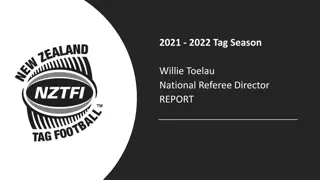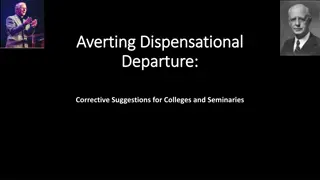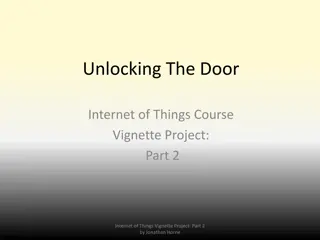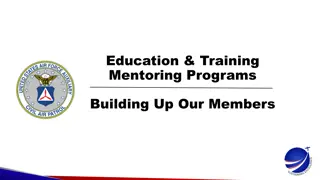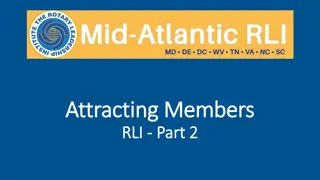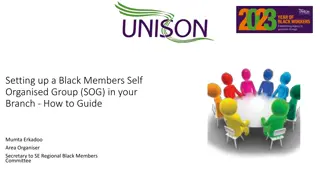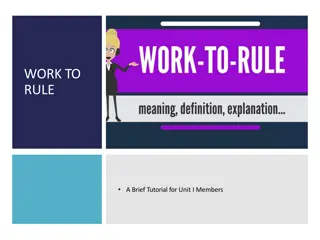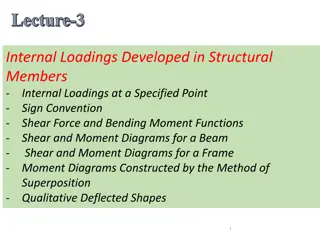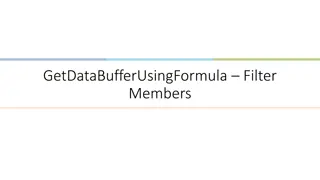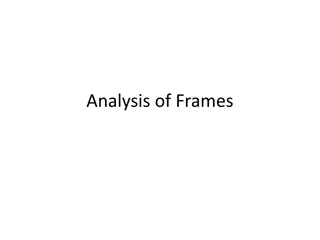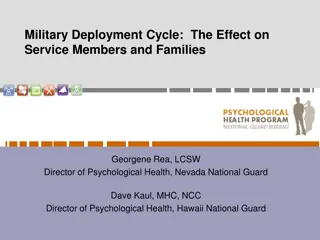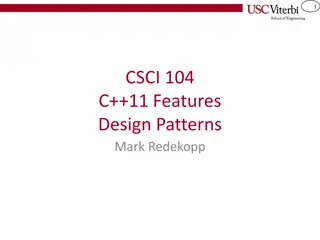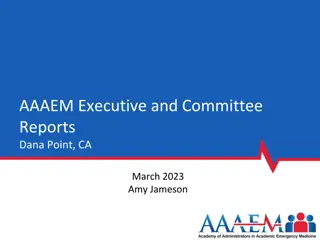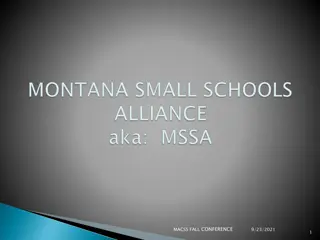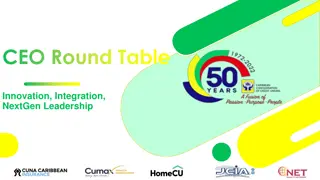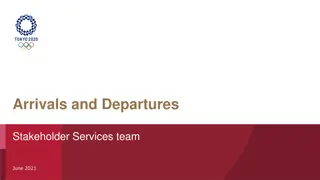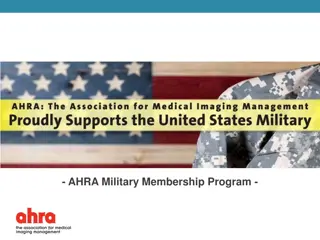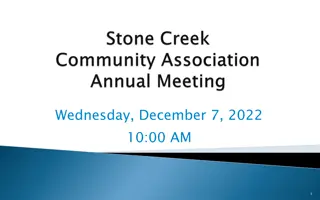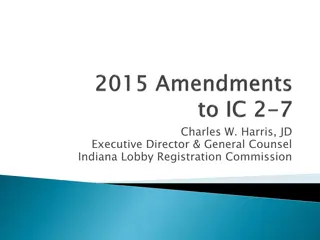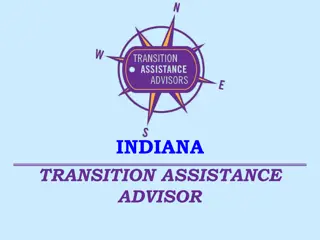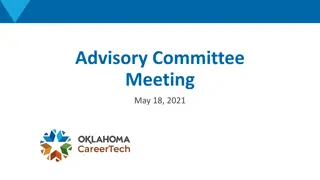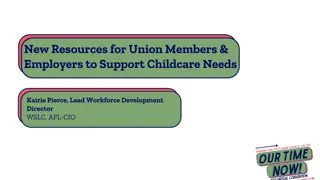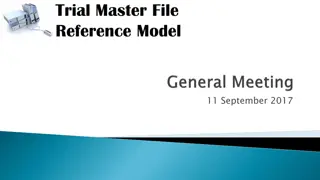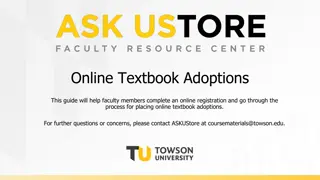Understanding Departures from the Guide for IACUC Members
This module delves into departures from the provisions of the Guide for IACUC members at an intermediate level. It covers defining departures, identifying examples, managing departures, and determining reporting requirements. Through various activities and discussions, participants gain insight into handling departures effectively to ensure compliance.
Download Presentation

Please find below an Image/Link to download the presentation.
The content on the website is provided AS IS for your information and personal use only. It may not be sold, licensed, or shared on other websites without obtaining consent from the author. Download presentation by click this link. If you encounter any issues during the download, it is possible that the publisher has removed the file from their server.
E N D
Presentation Transcript
Departures from the Guide Target Audience: IACUC Members Target Level: Intermediate Developed by: Ron Banks, Beth Ford, Neera Gopee, Marley Thrasher, Jim Weed
Goals Our goals for this session: Understand departures from the provisions of the Guide Manage departures to ensure compliance
Learning Objectives After attending this module, you will be able to: Define departure from the provision of the Guide 1 Identify examples of departures 2 3 Apply tool(s) to manage departures 4 Determine reporting requirements
Understand departures from the provisions of the Guide Define departure from the provision of the Guide Identify examples of departure
Group Work: Pictogram Talk to your group: 1. When you think of the word departure, what does that look like? Discuss as a group what a pictorial representation would look like. Use your flip chart to create a picture. (2 minutes) 2. Share your art with the rest of us. (2 minutes) Departures have consequences which may impact the animal positively or negatively.
Sowhats a Departure? Deviating from a must statement Deviating from a should statement under certain circumstances
What do you think? From the Guide Provision of 10 to 15 fresh air changes per hour in animal housing rooms is an acceptable guideline to maintain macroenvironmental air quality (p. 46) GEU has a rabbit room with six air changes per hour Is this a departure from the Guide?
What do you think? Directions: using your colored cards, vote on the following statements when asked: Must = Blue Should = Orange May = Green This flag indicates a page in reference materials.
What do you think? Institutional mission, programmatic goals, including the nature of animal use at the institution, and Program size will determine whether fulltime, part-time, or consultative veterinary services are needed. If a full-time veterinarian is not available on site, a consulting or part-time veterinarian __________ be available in visits at intervals appropriate to programmatic needs. Must = Blue Should = Orange May = Green From the Guide, page 14
What do you think? If a full-time veterinarian is not available on site, a consulting or part-time veterinarian should be available in visits at intervals appropriate to programmatic needs. In such instances, there _________ be an individual with assigned responsibility for daily animal care and use and facility management. Must = Blue Should = Orange May = Green From the Guide, page 14
What do you think? Wooden items ______ be replaced periodically because of damage or difficulties with sanitation. Painting or sealing wood surfaces with nontoxic materials may improve durability in many instances. Must = Blue Should = Orange May = Green From the Guide, page 51
Dont Forget! MUST A statement as a minimum standard required of all assured institutions. In other words Don t whine about it, just do it! SHOULD Often involves performance standards In other words Strongly recommended unless the IACUC says not to MAY Suggestions In other words Just think about it
Other Terms Performance Standard Describes a desired outcome while providing flexibility to achieve the desired outcome Usually deals with programs Exception Three exceptions in the Guide: experimental reasons for individual housing (e.g. urine collection), social incompatibility (e.g. male hamsters and fighting) and veterinary clinical concerns
Manage departures to ensure compliance Apply tool(s) to manage departures Determine reporting requirements
Our Tool Today https://grants.nih.gov/grants/olaw/Departures_flow_chart.pdf https://grants.nih.gov/grants/olaw/Departures_flow_chart.pdf
How do you use it? Determine the standard Determine if it s a departure Is it a requirement, strong recommendation or suggestion? Is it a specifically described exception or IACUC approved? Determine reporting requirements. https://grants.nih.gov/grants/olaw/Departures_flow_chart.pdf https://grants.nih.gov/grants/olaw/Departures_flow_chart.pdf
Group Work: Scenario SCENARIO: Open-top static cages which house dams and pups can t be disturbed for the first 10-14 days in accordance with well- established performance standards. The IACUC has approved.
Learning Objectives After attending this module, you will be able to: Define departure from the provision of the Guide 1 Identify examples of departures 2 3 Apply tool(s) to manage departures 4 Determine reporting requirements
Resources and Additional Info https://grants.nih.gov/grants/olaw/Departures_flow_chart.pdf Departures Flowchart: https://grants.nih.gov/grants/olaw/Departures_flow_chart .pdf The Guide: https://grants.nih.gov/grants/olaw/Guide-for-the-Care- and-use-of-laboratory-animals.pdf OLAW: https://grants.nih.gov/grants/olaw/olaw.htm Policy NOT-OD-12-148: https://grants.nih.gov/grants/guide/notice-files/NOT-OD- 12-148.html https://grants.nih.gov/grants/olaw/Departures_flow_chart.pdf https://grants.nih.gov/grants/olaw/Guide-for-the-Care-and-use-of-laboratory-animals.pdf https://grants.nih.gov/grants/olaw/Guide-for-the-Care-and-use-of-laboratory-animals.pdf https://grants.nih.gov/grants/olaw/olaw.htm https://grants.nih.gov/grants/guide/notice-files/NOT-OD-12-148.html https://grants.nih.gov/grants/guide/notice-files/NOT-OD-12-148.html
Summative Assessment 1. T/F Departures stem from the must, should, and may in the Guide. 2. Match the term with the statement: Term Statement A. Performance Standard and a strong recommendation _____ Must statement _____ Should statement B. Suggestion _____ May statement C. Minimum standard required 3. Describe a situation where a departure is identified but no report to the IO is required.
Summative Assessment - Scenario SCENARIO: A mouse room can t be accessed or animals observed for 24 hours because total darkness is required during this period. The PI provided scientific justification and the protocol was approved by the IACUC. QUESTIONS: Is this a departure? If yes, why? Is it reportable and if yes, to whom?
Thank You! Questions?
